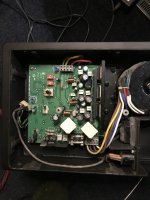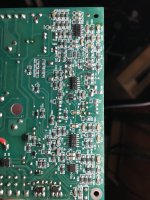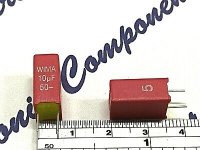Hello everybody,
I have these, SM100AK speakers, bought quite a few years ago. They are nice, but I think there are things to improve.
So from time to time, I make some mods, so to make them sound as much as they can. Worth it or not, to put money in these, not sure, but it is like a sport
and it is kind of interesting how things can evolve and improve 🙂
So what was done. I have changed all electrolytic caps to Panasonic FC and Panasonic NHG 4800uF in the power supply. There are some left few Chinese bipolars and
I'm thinking to change them to 'Muse'..? The film caps are Polyphenylene Sulfide, I don't why I changed not to Polypropylene, but it was done a long time ago. Is there much difference between Polyprops and these? Would you increase the size of the power caps? Bypass them with film caps? What would do to improve it?
I have shorted the Volume pots, and improved the sound a lot. The box is made of aluminum, so it has a very nice metallic sound 🙂 I have put bitumen adhesive material inside the walls and that was an improvement as well.
I'm wondering to change the ICs now. It has 3 x TL074 and 1 x NE554. 3 x opa1644 + 1 x opa1612? What do You think?
Any ideas are very welcome on how to improve it even more?
Thanks and have a good day.
I have these, SM100AK speakers, bought quite a few years ago. They are nice, but I think there are things to improve.
So from time to time, I make some mods, so to make them sound as much as they can. Worth it or not, to put money in these, not sure, but it is like a sport
and it is kind of interesting how things can evolve and improve 🙂
So what was done. I have changed all electrolytic caps to Panasonic FC and Panasonic NHG 4800uF in the power supply. There are some left few Chinese bipolars and
I'm thinking to change them to 'Muse'..? The film caps are Polyphenylene Sulfide, I don't why I changed not to Polypropylene, but it was done a long time ago. Is there much difference between Polyprops and these? Would you increase the size of the power caps? Bypass them with film caps? What would do to improve it?
I have shorted the Volume pots, and improved the sound a lot. The box is made of aluminum, so it has a very nice metallic sound 🙂 I have put bitumen adhesive material inside the walls and that was an improvement as well.
I'm wondering to change the ICs now. It has 3 x TL074 and 1 x NE554. 3 x opa1644 + 1 x opa1612? What do You think?
Any ideas are very welcome on how to improve it even more?
Thanks and have a good day.
Attachments
I would not change the op amps but maybe put some 22 mfd electrolytic from plus to minus on everyone. Try out. What did the changes until now to the Sound?
22uF on Power pins?
Why not change? It would need some changes around ICs? Would do more mess than good? Not even 5534?
I don't remember the exact effect when the caps were changed, but shorted potentiometer improved clarity a lot. And some weird weirdness between speakers disappeared, some phase thing in some frequencies. Removed box resonances with bitumen improved clarity, and separation as well.
Why not change? It would need some changes around ICs? Would do more mess than good? Not even 5534?
I don't remember the exact effect when the caps were changed, but shorted potentiometer improved clarity a lot. And some weird weirdness between speakers disappeared, some phase thing in some frequencies. Removed box resonances with bitumen improved clarity, and separation as well.
I think putting slightly bigger caps from 4700 to 6800 is possible. If it is a class AB Amp. But the job is done.
But doubling the capacity or more can bring distortion up if the diodes and the transformer are exactly calculated. Then it sounds worse than before and building back is necessary
I experienced more powerful sound in presence and authority putting a small electrolytic directly between the plus minus pin of every op Amp. You can easily check this out with A /B comparison with a Mono signal between the two speakers.22uF on Power pins?
Why not change? It would need some changes around ICs? Would do more mess than good? Not even 5534?
I don't remember the exact effect when the caps were changed, but shorted potentiometer improved clarity a lot. And some weird weirdness between speakers disappeared, some phase thing in some frequencies. Removed box resonances with bitumen improved clarity, and separation as well.
Bitumen on the inner walls is certainly a good tweak for better sound
If you do "op Amp rolling" you usually have to check the schematic which op Amp can be chosen. Some have measurement possibilities and know how to check the result. If oscillation occurs you make it worse, not better
Wonderful info, I will try 22uF mod. thanks. It uses TDA7296 chip amps.
Yes, I'm aware of oscillation. Is there maybe some 'safe bet', to avoid oscillation, without measuring?
AND there is a ceramic cap in the HF+ path, labeled PSW. What it is for? Kind of buffer not to blow the HF driver when powering the speakers?
Yes, I'm aware of oscillation. Is there maybe some 'safe bet', to avoid oscillation, without measuring?
AND there is a ceramic cap in the HF+ path, labeled PSW. What it is for? Kind of buffer not to blow the HF driver when powering the speakers?
Ceramic cap - how many microfarads has it? Is it in parallel with another cap?
Good next tweak: avoid lose wadding in a reflex box. Take it out and put on all sides if possible pyramid foam so that it does not move or vibrate. You get better transients in the bass.
Put a piece of foam glued to the backside of the bass magnet (omit closing vented pole piece) the foam is in the middle of the box and reduces resonances which cannot be reached by foam on the sides on the enclosure
Good next tweak: avoid lose wadding in a reflex box. Take it out and put on all sides if possible pyramid foam so that it does not move or vibrate. You get better transients in the bass.
Put a piece of foam glued to the backside of the bass magnet (omit closing vented pole piece) the foam is in the middle of the box and reduces resonances which cannot be reached by foam on the sides on the enclosure
I am not an expert for op amps but if you take the TL074 out and put one in which is not "faster" it could work. Which other one I have no suggestion. But usually you have to check if they are in the signal path. If not do not touch them.
The ceramic cap has this marking '12 XF 040' - 0,12uF 40V?
It is in series, in HF+ signal path. I'm not sure at the moment, but I think the signal goes from the inductor to this ceramic cap to HF+ output.
"Good next tweak: avoid lose wadding in a reflex box. Take it out and put on all sides if possible pyramid foam so that it does not move or vibrate. You get better transients in the bass.
Put a piece of foam glued to the backside of the bass magnet (omit closing vented pole piece) the foam is in the middle of the box and reduces resonances which cannot be reached by foam on the sides on the enclosure"
VERY INTERESTING, thanks!
It is in series, in HF+ signal path. I'm not sure at the moment, but I think the signal goes from the inductor to this ceramic cap to HF+ output.
"Good next tweak: avoid lose wadding in a reflex box. Take it out and put on all sides if possible pyramid foam so that it does not move or vibrate. You get better transients in the bass.
Put a piece of foam glued to the backside of the bass magnet (omit closing vented pole piece) the foam is in the middle of the box and reduces resonances which cannot be reached by foam on the sides on the enclosure"
VERY INTERESTING, thanks!
It seems the ceramic cap is a small one. I only saw a small ceramic cap in a Acoustic Research HiRes Loudspeaker AR15 in parallel to MKT capacitors. However changing the one MKT capacitor which was in series before the tweeter with a polypropylene type was clearly audible better in sound.Wonderful info, I will try 22uF mod. thanks. It uses TDA7296 chip amps.
Yes, I'm aware of oscillation. Is there maybe some 'safe bet', to avoid oscillation, without measuring?
AND there is a ceramic cap in the HF+ path, labeled PSW. What it is for? Kind of buffer not to blow the HF driver when powering the speakers?
Is the loudspeaker a two way active system? Then a capacitor in series before the tweeter is not plausible. Has it a two way crossover? And the amplifier is mono in the loudspeaker? Just one amp for a classicla two way loudspeaker with passive crossover?
Yes, it is an active two-way system. With the active crossover, filtered (I guess) with the TL074s and with the NE5534 input buffer.
It has three TDA7296 chips, one for the tweeter and two bridged for the woofer.
It has three TDA7296 chips, one for the tweeter and two bridged for the woofer.
TL74 and Tl072 have a sonic signature. They can sound nice and pleasant. If you like thw sound now do not change them. If not try NE5543/32 this is a good op amp cncerning noise. or 4558. last one is sonically neutral. most i like lm4562.
No love for Burrbrown opamps? 🙂 My aim is for as much neutrality as possible.
Would be safe to bypass the ceramic cap for HF+ output?
There are two bipolar electrolytic at the signal input. + and - have each 10uF bipolar. Any ideas about what they are there for?
Would be safe to bypass the ceramic cap for HF+ output?
There are two bipolar electrolytic at the signal input. + and - have each 10uF bipolar. Any ideas about what they are there for?
With changing parts take care they fit into the place where you put them. Foil Cs are much bigger
Thank you all for this thread. I've been on SM100AK as my daily drivers for about 12 years now and reading this made me realize that I have done exactly zero maintenance on them this whole time.
Just working out the master volume with deoxit really cleared things up, pots were pretty scratchy so I doubt there was a 100% good connection at the wiper. I also cleaned the internal molex connectors and the other trim pots. I'd love to short the volume knob out of the circuit, but I run at about 50% volume to match my space and my subwoofer. Could maybe replace the pots with a matched pair of fixed-value resistors. (Also maybe put a resistor in the power LED circuit -- I taped over the LEDs years ago because they are too bright and pointed right at me, very distracting. I'd love it if they were on but just much dimmer.)
I was surprised to find the one piece of sonic treatment just floating around inside the cabinet. I applied foam to the inner walls of the cabinet, as well as the back of the LF driver magnet. This made a pretty big change. Before this change I had a tiny and well-defined sweet spot and I really needed to have my head in the right position to experience it. Now I do not notice a distinct boundary to the sweet spot. Pretty great!
I am also curious about the op amp / filter cap mod. Has anyone done this & willing to share pics / results?
Just working out the master volume with deoxit really cleared things up, pots were pretty scratchy so I doubt there was a 100% good connection at the wiper. I also cleaned the internal molex connectors and the other trim pots. I'd love to short the volume knob out of the circuit, but I run at about 50% volume to match my space and my subwoofer. Could maybe replace the pots with a matched pair of fixed-value resistors. (Also maybe put a resistor in the power LED circuit -- I taped over the LEDs years ago because they are too bright and pointed right at me, very distracting. I'd love it if they were on but just much dimmer.)
I was surprised to find the one piece of sonic treatment just floating around inside the cabinet. I applied foam to the inner walls of the cabinet, as well as the back of the LF driver magnet. This made a pretty big change. Before this change I had a tiny and well-defined sweet spot and I really needed to have my head in the right position to experience it. Now I do not notice a distinct boundary to the sweet spot. Pretty great!
I am also curious about the op amp / filter cap mod. Has anyone done this & willing to share pics / results?
I build loudspeakers very often. End users who only buy ready made boxes often try to influence the sound with cables and so on.
But as a designer I know how much the mechanics is crucial for the sound as I try a lot of changes and listen to them: correct damping in the box, damping resonances of the box walls, getting rid of diaphragm resonances all this makes big differences in sound - magnitudes higher than cable issues.
But as a designer I know how much the mechanics is crucial for the sound as I try a lot of changes and listen to them: correct damping in the box, damping resonances of the box walls, getting rid of diaphragm resonances all this makes big differences in sound - magnitudes higher than cable issues.
- Home
- Amplifiers
- Chip Amps
- Sonodyne SM100AK MOD


